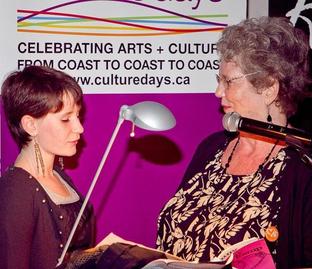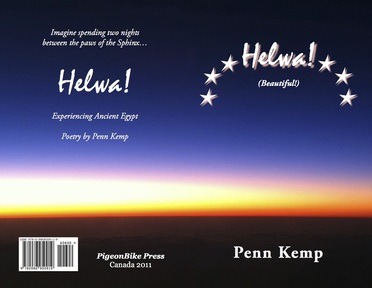RUSTY TALK WITH PENN KEMP Penn Kemp Penn KempPhoto by Wendy Saby London, Ontario performance poet, activist and playwright Penn Kemp is the 40th Life Member of the League of Canadian Poets. This year she received the Queen Elizabeth 11 Diamond Jubilee medal for service to the arts. Penn has published twenty-five books of poetry and drama, had six plays and ten CDs produced as well as Canada’s first poetry CD-ROM and several award-winning videopoems. As the inaugural Poet Laureate for the City of London, she initiated and judged Poetry in Motion and the National Haiku Competition. As Canada Council Writer-in-Residence for University of Western Ontario for 2009-10, her project was the DVD, Luminous Entrance: a Sound Opera for Climate Change, Pendas Productions. Kathryn Mockler: What is your first memory of writing creatively? Penn Kemp: I remember my own early discovery of and delight in language. As a child, I did not coddle my dolls. I sat them up and read the poems, stories and nursery rhymes my mother had read to me. The words she read would sink into the well of my hearing and become part of me; their rhythms would dance inside my body like northern lights. I ate up those words with a necessity as strong as hunger. Even at first hearing, the words were somehow familiar as if I recognized in them old friends. I remember swelling proudly with the power of words, in learning first to read and then actually to write, to put down the letters so that they made sense to anyone who could read. I wrote my first poem when I was six, excited and amazed at having created through apparent magic something out of nothing with marks on a page accompanied by a drawing of kids skating. I glimpsed a world in which words had a life of their own, just as toys did. I knew that if I could wake at the right time at night I would catch my toys at play. So too, I felt words could be surprised and brought to life on the page. Writing that first poem was the first time that I recall consciously feeling that I was doing an adult thing creating something entirely on my own, assuming independence growing up! I felt like the Little Red Hen in the nursery story: "‘I can do it myself,’ said The Little Red Hen, and she did." KM: What keeps you going as a poet or why do you write? PK: When I write, I begin an adventure equipped with my writing tools and everything else I know about myself and the world. By the end of the day, everything I knew and thought may be transformed or discarded. It intrigues me that what I know and start off with is the very means for realizing what is unknown. I write to articulate the moment, to puzzle out feelings or incidents I can't figure out. The best poems come, though, when I follow the language of a striking phrase. Sound leads me. KM: Could you describe your writing process? (For example, do you write every day? When? Where? How do you approach revision, etc.) PK: I write every day, in the morning, in the little room that was my childhood bedroom. It looks out on a small greenhouse, a source of inspiration and delight all year. The green throughout the winter keeps me from getting restless and hungry for sun. Often in the morning as I transcribe dreams, they become poems. They're not usually very good poems so they don't see the light of day beyond a file in my computer, but they keep the energy of poetry flowing. The problem I have with them is that they are too narrative and I feel I need to stick to the literal story line that the dream gave me. I revise constantly, even when I am performing, pencil often in hand. Reading the poem in front of an audience allows me to really hear what works...and what does not. My first book, Bearing Down, was performed in four voices for a Seattle FM radio show in 1973. That performance opened up the door to possibilities for the spoken word in those early days. I've been lifting the word off the page any way I could since then, most recently in videopoems. But the ear remains my first love. Concentrating on the voice rather than gesture or physical presence in communicating poetry has taught me to listen acutely, and that's had an effect not just on my sound poetry but on all my work. Collaborating with artists of different disciplines is exciting and energizing. And with the Cloud, friends and fans can hear the work in Brazil, in India, in Britain simultaneously!” KM; What writers were influential to you when you first started out? And what poets are you reading now? PK: Victor Coleman, the editor at Coach House Press and a neighbour on Toronto Island, was influential and encouraging in introducing me to the poetic community across North America. My first book, Bearing Down, came out from Coach House, 1972. I organized a poetry reading series at A SPACE in Toronto for several years in the early Seventies. I invited poets I admired, like P. K. Page, Phyllis Webb, Daphne Marlatt, all of whom became friends and correspondents. In those days, the Canada Council sponsored American poets so I invited heroes like Diane di Prima, Allan Ginsberg, Robert Creeley and Edward Dorn, all very influential. I read avidly and widely as poetry continues to inspire new poems. These days I edit quite a few manuscripts for poets, and I read poets coming to London as well as books for my literary radio show, Gathering Voices. And new books coming out: I particularly like Brick Books. KM: Your funniest literary moment, if you have one. PK: The funniest literary moment happened this year on January 11 at 8.30am. As Poet Laureate for the City of London, I was formally addressing 1200 folks at the Mayor's STATE OF THE CITY ADDRESS” at the London Convention Centre. The topic was “Believe…”. Well, I couldn't believe the three very audible interruptions! They turned out to be the complaints of a Russian robot. It was squawking in Russian that its battery was wound down. I kept on talking: you can see the situation on livestream. KM: What are you working on now? PK: I wish I could say that I'm finishing a manuscript and I am, slowly, but the times demand I continue as an activist in protesting federal budget cuts. So I'm organizing a reading Saturday, September 29, 2012, 2-4 pm. "100,000 Poets for Change" Reading for Culture Day. Landon Public Library (downstairs), 167 Wortley Rd., London, ON. Our free afternoon reading will be part of an international event which will take place in many cities, in many villages and in the countryside all over the world, at the same time and date. The first order of change is for poets to get together to perform, educate and entertain, simultaneously with others around the world, changing how we see our own community and the global community. The host in Toronto who asked me to organize a London reading may be doing some Skype connections with us and other cities, other provinces. Such an event ties in nicely with our national Culture Days happening at the same time. There will be a blog for us on 100,000 Poets for Change. Twenty-three poets are signed up, including Susan McMaster, President of The League of Canadian Poets. Musicians Jennifer White and Robert McMaster as well! Good will? Immeasurable! And I am writing a book on Jack Layton's support of and interest in the arts in Canada. I'm now collecting anecdotes, reminiscences and opinions or observations about Jack and the arts Jack in the arts (that guitar, that piano, that revised song!) the role of the arts for him. As Jack would remind me, he was a proud member of the Writers’ Union! I've just collated all his emails to us and they include some interesting discussions. They're bitter-sweetly sad to read now, given all we have lost in Jack...but of course we continue in hope. I’ll also be interviewing folks for my radio show, Gathering Voices. Olivia Chow endorses the work: "I heartily encourage folks to send Penn your stories of Jack’s relationship with and his support of the arts. This project is a great opportunity to share our stories about how Jack and the NDP celebrated our Canadian cultures and what we must do together to continue this relationship. You know he loved to make music and we loved to dance!" When Jack Layton died last August, he was given a state funeral. Roy Thompson Hall was packed; the lineup of artists celebrating Jack stellar and the street theatre outside was sublime. I would like to commemorate Jack’s birthday in July and the first anniversary of his death with two e-shorts on Amazon.ca. I believe such pieces would be timely and widely read, given the nation’s outpouring of love and sympathy. Jack Layton's support of and interest in the arts in Canada underlay his politics. In his long municipal and federal political life, he always included and encouraged artists to become activists. My working title is Jack Layton: Art for Action! On Saturday, August 4, I'm participating in The Summer Soirée Festival of the Arts, Aeolian Performance Hall, London, Ontario. Afternoon workshop Gary Diggins, Jocelyn Drainie and me on The Healing Nature of Sound and then an evening performance, Sonica Hypnotica. Chris Meloche and I will kick off the evening event with new work in progress from The Electric Folklore Machine.  PENN KEMP'S MOST RECENT BOOK Helwa!, PigeonBike Press, 2011 Description PigeonBike Press has launched Penn Kemp's chapbook of Helwa! alongside the release by Pendas Production of Penn Kemp's CD, Night Vision, which includes Helwa!. Since her first book was published by Coach House Press in 1972, she has been pushing textual and aural boundaries, often in participatory performance work. Many of her recent CDs are what Penn terms "Sound Operas": poetic narratives that weave sound, imagery and music in the counterpoint of many voices. Working across a variety of cultural practices to engage her audience, she hosts an eclectic literary show, Gathering Voices, archived on CHRW. Having performed in festivals around the world, most recently in Britain, Brazil and India, Penn lives in London Canada, where she edits poetry for Pendas Productions, a small poetry publisher she and husband Gavin Stairs run. Penn has been heralded by the Writers’ Union as a “one woman literary industry”. BETWEEN BETWEEN Between Between is a short film that concerns the process of mourning, translating some of Penn Kemp's performance poetry into visual imagery for a compelling, evocative portrayal of that state. Between Between examines the experience both of the mourner and (perhaps) of the newly dead. A Penn Kemp and Dennis Siren collaboration.
Kathryn Mockler is the publisher of The Rusty Toque. Comments are closed.
|
Rusty Talk
Rusty Talk Editor: Archives
November 2017
Categories
All
|

 RSS Feed
RSS Feed
